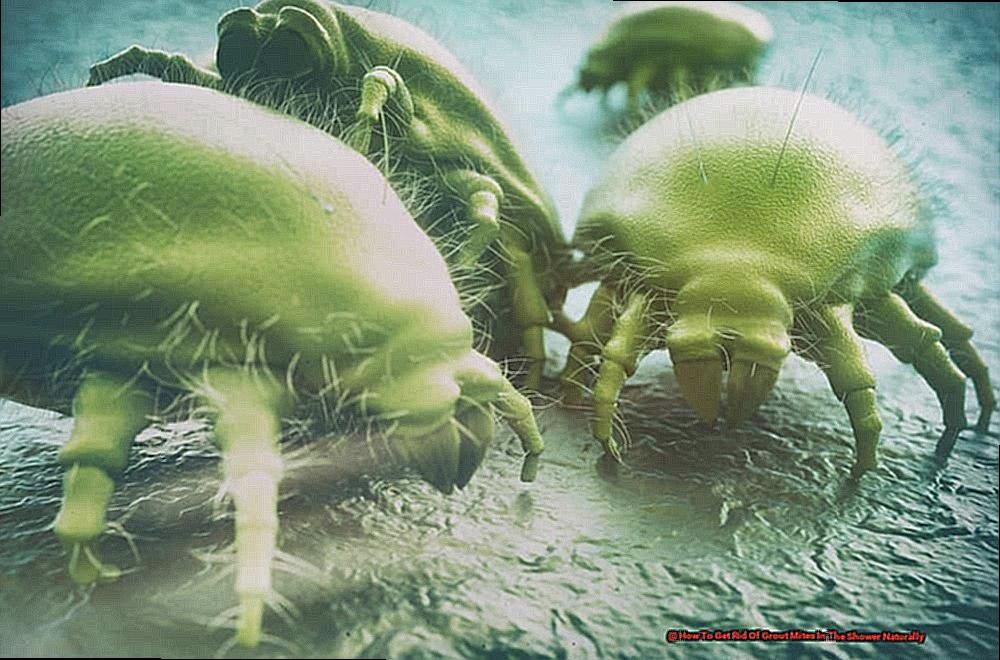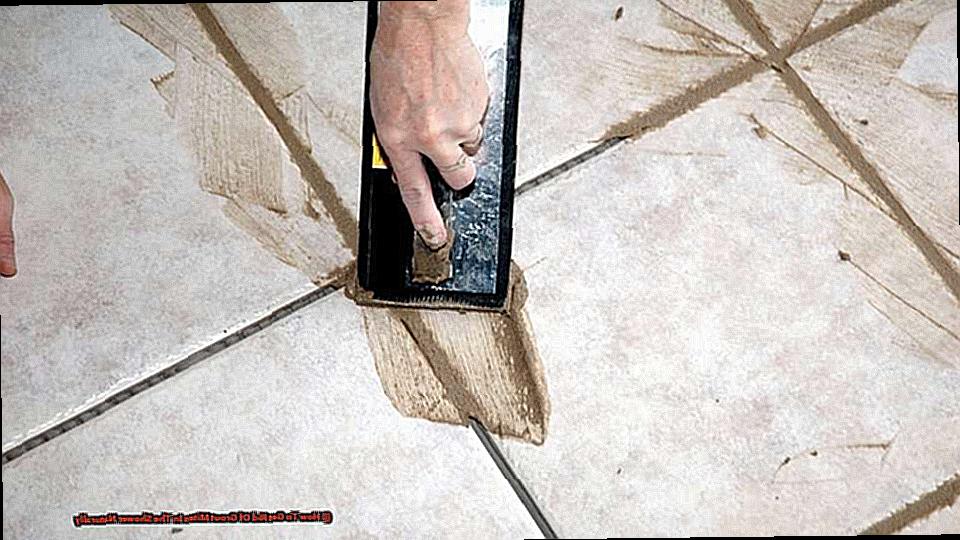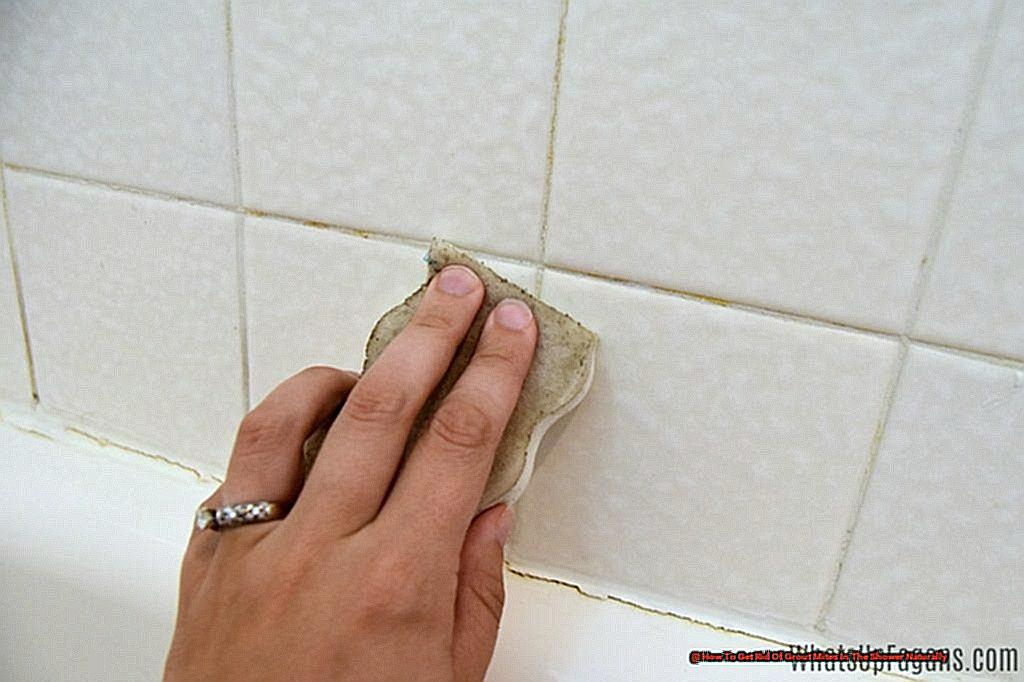Do you dread taking a shower because of the tiny bugs crawling around your tiles? No matter how much you clean, those pesky grout mites seem to always find their way back. But fear not, there are natural ways to eliminate these unwelcome guests without resorting to harsh chemicals. Here’s what you need to know:
- Grout mites are tiny pests that thrive in warm and damp environments, such as your shower.
- While they are not harmful to humans, they can cause allergies and skin irritation.
- Keeping your shower clean and dry is the first step in preventing grout mites from infesting your space.
- Essential oils like tea tree oil, eucalyptus oil, and peppermint oil have natural insecticidal properties that can repel and kill grout mites.
- A simple DIY solution of equal parts white vinegar and water sprayed on affected areas can also help get rid of grout mites.
- For a more thorough cleaning, consider using a steam mop or steam cleaner as high temperatures can effectively kill grout mites.
Say goodbye to those irritating grout mites with these easy and natural methods. Keep reading for more detailed information on how to banish them from your shower once and for all.
Table of Contents
- 1 Why Do You See Bugs On Shower Grout?
- 2 5 Tiny Bugs In The Shower Grout That Spread Fast
- 3 Psocids Mites On Shower Grout And Bathroom Floor
- 4 Mold Mites On Shower Grout
- 5 Drain Flies In Bathroom Floor Tiles And Shower Grout
- 6 Silverfish In Bathroom Grout
- 7 Worms On The Bathroom Grout
- 8 How To Get Rid Of Tiny Bugs In The Shower Grout?
- 9 Conclusion
Why Do You See Bugs On Shower Grout?
Bugs on shower grout can be a common issue, often caused by poor hygiene and maintenance, food particles, humid climates, and lack of proper upkeep. These factors create the perfect breeding ground for bugs to thrive and reproduce on grout.
To prevent bug infestations on shower grout, regular cleaning and maintenance are crucial. This includes wiping down the grout after each use and deep cleaning at least once a week. It is also important to address any leaks or cracks in the shower, as excess moisture can attract bugs.
Utilizing natural cleaning solutions like vinegar, baking soda, and lemon juice can also help repel bugs from your shower. These ingredients have natural insect-repelling properties and are safe to use without causing harm to humans or pets.
Keeping the shower area dry and clutter-free is another important step in preventing bugs from making their home on grout. Regularly removing any food particles or products from the shower area can also discourage bugs from returning.
Additional tips for preventing bug infestations on shower grout include installing a dehumidifier in the bathroom, using essential oils with anti-fungal properties, and employing natural repellents such as citrus peels or vinegar spray.
5 Tiny Bugs In The Shower Grout That Spread Fast
To effectively combat the spread of grout mites in your shower, it is crucial to maintain cleanliness, dryness, and proper ventilation in the area. Regularly wiping down surfaces after use, sealing any cracks or gaps in tiles and grout, using natural repellents, deep cleaning, and ensuring adequate ventilation are all effective measures to prevent grout mites from spreading.
By taking these preventive steps, you can prevent grout mites from causing damage to your shower and potentially infesting other areas of your home. Refer to the table below for a summary of these actions.
| Step | Action |
| Clean and Dry | Make it a habit to regularly wipe down shower surfaces after use to eliminate moisture and discourage grout mites from settling. |
| Seal Cracks and Gaps | Conduct regular inspections and promptly repair any damaged grout or tiles to prevent grout mites from hiding and breeding. |
| Use Natural Repellents | Create a mixture of essential oils or vinegar with water and spray it on affected areas to deter grout mites. |
| Deep Clean Regularly | Scrub away dirt, grime, and mold at least once a week to eliminate potential breeding grounds for grout mites. |
| Ensure Proper Ventilation | Make use of an exhaust fan or open a window after showering to reduce humidity and make the area less appealing for grout mites. |
Remember to take proactive measures and act quickly upon noticing any signs of grout mites to prevent them from spreading.

Psocids Mites On Shower Grout And Bathroom Floor
Psocid mites are tiny pests that thrive in moist and moldy environments, making the bathroom a perfect breeding ground for them. These minuscule creatures, measuring only 1mm in size, can easily make their way into shower grout and onto bathroom floors. They can also be spread through infested items like towels and toothbrushes.
To effectively get rid of psocid mites without resorting to harsh chemicals, there are several steps you can take:
- Increase the temperature: Psocids cannot survive in high temperatures, so turning up the heat in your bathroom can help eliminate any existing mites. However, make sure to keep the bathroom well-ventilated while doing so.
- Use vinegar solutions: Vinegar is a natural deterrent for psocids and can also help eliminate mold, which is a food source for these pests. Create a solution using equal parts water and white vinegar and spray it on affected areas. Leave it for a few hours before wiping it away.
- Reduce humidity levels: Psocids thrive in humid environments, so lowering the humidity in your bathroom can help prevent infestations. You can use a dehumidifier or open windows to let fresh air in.
- Remove infested items: If you notice psocids on items in your bathroom, remove them and wash them thoroughly. This will help prevent further infestations.
- Regular deep cleaning: Regularly deep cleaning your bathroom, including shower grout and floors, is crucial in preventing psocid mite infestations. You can use natural cleaners like baking soda and vinegar to avoid using harsh chemicals.
| Pros | Cons |
| Effective natural remedies available | May require consistent effort and maintenance |
| No harmful chemicals used | May not work for severe infestations |
| Can be cost-effective | May not work for all types of psocid species |
| Prevents potential health hazards | May take longer to see results compared to chemical solutions |
| Environmentally-friendly option | Natural remedies may have a strong odor |
Preventing psocid mite infestations on shower grout and bathroom floors can be achieved through regular cleaning, proper ventilation, and using natural remedies such as increasing the temperature or using vinegar solutions.
However, it is important to note that severe infestations may require the use of chemical solutions.
Mold Mites On Shower Grout
Mold mites, also known as mold gnats or fungus gnats, are tiny insects that thrive in damp and humid environments such as bathrooms.
These minuscule creatures can cause damage to the shower grout over time by feeding on organic matter. As a result, the grout may become discolored, weakened, and even crumble.
In addition to these physical effects, mold mites can also trigger allergies and respiratory issues in some individuals. Fortunately, there are natural ways to eliminate them.
First and foremost, it’s important to identify and fix sources of moisture in your bathroom. Additionally, cleaning with natural solutions like vinegar or hydrogen peroxide can help get rid of mold mites.
Using food-grade diatomaceous earth is another effective method for eliminating these pests. Incorporating essential oils into your cleaning routine not only helps keep the grout clean but also deters mold mites from infesting.
Remember to keep the grout clean and dry to avoid providing a suitable environment for mold mites to thrive.
Drain Flies In Bathroom Floor Tiles And Shower Grout
It is not uncommon for drain flies to invade bathroom floor tiles and shower grout, entering through open windows or doors, cracks in walls or pipes, or hitchhiking on clothing or pets. To naturally eliminate these pesky pests, it is essential to first identify the source of the infestation. Once identified, keeping the bathroom clean and dry is crucial. Additionally, using natural traps can be effective in reducing their population. However, prevention methods are key in avoiding future infestations. This includes promptly fixing any leaks and regularly cleaning the bathroom to remove potential breeding grounds for drain flies.
A common misconception is that these flies are attracted to dirt and grime. However, they are actually drawn to the moist environment that bathrooms provide. This is why keeping the bathroom clean and dry is so important in preventing and eliminating drain flies. One simple way to keep the bathroom dry is by wiping down any wet surfaces after use, such as shower walls, floors, and sinks.
In addition to keeping the bathroom clean, using natural traps can also aid in getting rid of drain flies. These traps can be made using household items such as apple cider vinegar, dish soap, and plastic wrap. Simply mix equal parts apple cider vinegar and dish soap in a bowl and cover with plastic wrap. Poke small holes in the wrap, allowing the flies to enter but not escape. The scent of the vinegar will attract the flies while the soap will trap them.
To prevent future infestations, it is crucial to address any potential entry points for drain flies. This includes fixing any leaks or cracks in walls or pipes, as well as regularly cleaning drains and pipes to remove any buildup that may attract these flies.

Silverfish In Bathroom Grout
Silverfish are tiny, grey insects with a glossy exterior and three lengthy bristles at the end of their tails. They have a strong affinity for damp and dim spaces, making bathrooms a popular target for infestation. These pesky creatures can enter your bathroom through various means, such as cracks in windows or walls, gaps in the foundation, or unintentional transfer from contaminated objects.
But how can you tell if your bathroom is infested with silverfish? Well, their presence can be identified by their small size and distinctive appearance. Their shiny bodies and long bristles are difficult to miss. Furthermore, they are often found scurrying around in search of food, which may consist of starchy materials such as wallpaper paste or book bindings.
So, what can you do to get rid of these unwelcome guests? Firstly, it is important to locate and seal any potential entry points into your bathroom. This could involve filling in cracks and gaps with caulk or using weather stripping on windows and doors. Additionally, reducing moisture levels in your bathroom by fixing leaks and using ventilation can help deter silverfish.
If you do find yourself with a silverfish infestation, don’t panic. There are several natural remedies that can effectively eliminate them. One option is to create a mixture of equal parts water and white vinegar and spray it around the areas where silverfish are commonly found. Another method is to sprinkle diatomaceous earth (DE) around your bathroom. DE is a natural powder that causes dehydration in insects.
Remember, it’s important to be proactive in preventing silverfish infestations by keeping your bathroom clean and dry. By following these tips, you’ll be able to maintain a silverfish-free bathroom without relying on harsh chemicals or professional exterminators.
Worms On The Bathroom Grout
Bathroom grout is a common target for worms, and there are numerous potential causes. These may include:
- The bathroom’s damp and humid environment, which attracts these pests.
- Worms can enter through cracks or gaps in the walls or floors.
- The build-up of debris and organic matter, such as hair, soap scum, and skin cells, provides an ideal habitat for worms to thrive.
To naturally eliminate worms on bathroom grout, follow these steps:
Step 1: Identify the type of worm
It is important to determine the type of worm you are dealing with. These pests are typically small, white, and thin, and can be seen crawling on the grout or near drains. They are actually drain fly larvae and are not harmful to humans.
Step 2: Regular cleaning
Maintaining a clean bathroom is crucial in preventing these pests from appearing. Use a mixture of mild dish soap and warm water to clean the grout and remove any debris or organic matter that may be attracting the worms.
Step 3: Use hot water
Flushing hot water down drains can help eradicate these pests. Additionally, hot water can dissolve any accumulation of debris or hair that may be causing the infestation.
Step 4: Try bio-enzymatic cleaners
Bio-enzymatic cleaners utilize natural enzymes to break down organic matter and eliminate pests like worms. These cleaners can be poured down drains or applied directly to affected areas.
Step 5: Use baking soda and vinegar
A combination of baking soda and vinegar can also aid in getting rid of these pests. Pour a cup of baking soda down the drain, followed by a cup of vinegar. Let it sit for 15 minutes before flushing with hot water.
Step 6: Prevent future infestations
To avoid worms from appearing on your bathroom grout in the future, ensure proper ventilation in the bathroom and promptly repair any leaks. You can also use drain strainers to catch debris and regularly clean your drains with a pipe brush or plumbing snake.
In conclusion, worms on bathroom grout can be a nuisance, but they can be easily eliminated and prevented with natural remedies and proper maintenance.
How To Get Rid Of Tiny Bugs In The Shower Grout?
Many natural ways exist to get rid of grout mites in your shower. Some of these are using vinegar, baking soda, tea tree oil, lemon juice, and borax as cleaners, keeping the shower dry and well-ventilated, fixing any leaks or cracks, using essential oils as natural repellents, and putting citrus peels in cracks and corners as a natural deterrent.
Most of these ways will work to get rid of grout mites, but you should also clean and keep your shower on a daily basis. As part of your regular cleaning practice, you can make sure that your shower is bug-free and clean.
Naturally cleaning with things like vinegar, baking soda, and essential oils not only gets rid of grout mites but also makes your home healthy for you. These things are safe for people and pets and won’t hurt them in any way. Furthermore, keeping the shower dry and well-ventilated not only stops grout mites but also helps keep the shower clean overall.
In addition, fixing any shower leaks or cracks keeps grout mites away and also stops water damage and mold growth. Once in a while, you should look for leaks or cracks and fix them right away to avoid more problems.
Aromatherapy with essential oils like tea tree oil or eucalyptus oil can not only clean naturally, but it can also keep grout mites away. To keep grout mites away, just mix a few drops of these oils with water and spray it in cracks and around corners.
Last but not least, putting citrus peels in cracks and gaps can also naturally keep grout mites away. Bugs don’t like the smell of citrus fruits, so they will stay away from your shower.
Conclusion
In summary, the constant presence of grout mites in your shower can be a source of aggravation.
Don’t forget to check for any leaks or cracks in your shower and maintain a dry environment to prevent future infestations.





